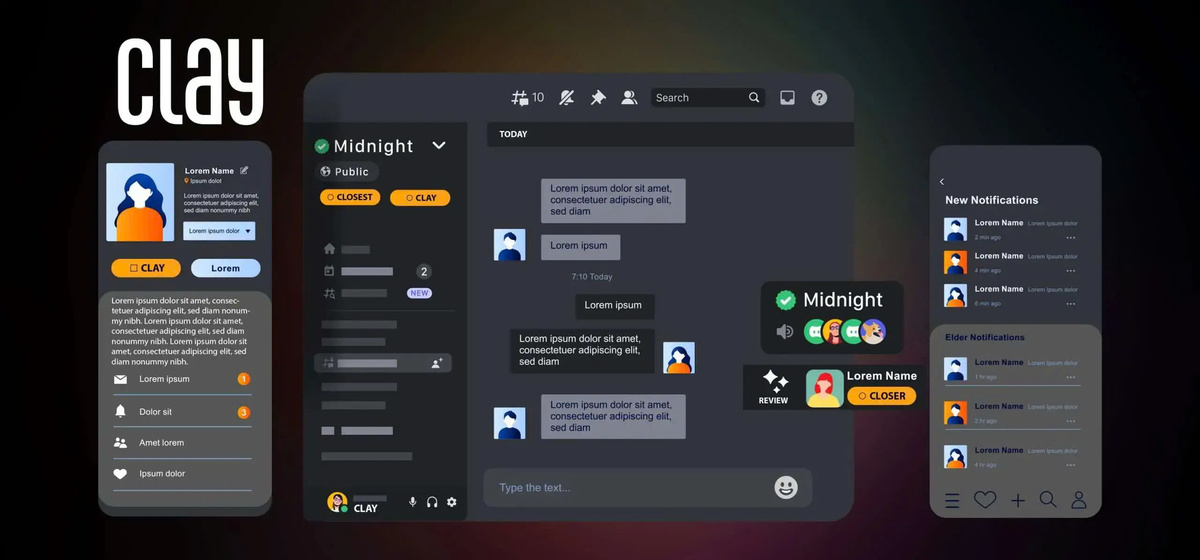Clay is a powerful customer data and relationship management platform that helps businesses automate processes and improve communication efficiency. Launched in 2018, Clay quickly became a reliable tool for many businesses thanks to its flexible integration and ease of use.

Introducing Clay
Clay's history and birth
Clay was developed by a team of engineers and entrepreneurs with the goal of creating a powerful and easy-to-use customer relationship management (CRM) tool. They realized that many businesses, especially small and medium-sized enterprises, are having difficulty managing customer information and automating business processes.
From there, the Clay development team focused on building a highly customizable CRM platform, allowing users to set up workflows that suit their own unique needs. Since its launch in 2018, Clay has quickly attracted the attention of many businesses thanks to its innovation and high applicability.
Clay highlights
Clay's highlight is its highly customizable capabilities, allowing users to set up workflows that suit their unique needs. In addition, Clay also has the following outstanding features:
- Comprehensive customer information management : Clay provides a complete customer information management system, including storing, classifying and analyzing customer data.
- Powerful data analytics : The platform includes data analytics tools that help businesses better understand market trends and customer behavior.
- Flexible automation and integration : Clay allows automating workflows such as sending emails, updating data, and easily integrating with other applications such as Salesforce, HubSpot.
With these features, Clay has become a reliable and useful tool for many businesses, especially small and medium enterprises.
Clay use cases
Clay has many applications in business practice, meeting different needs of businesses. Here are some common use cases of this platform:
Customer management
One of Clay's key features is its comprehensive customer information management capabilities. This platform allows businesses to store, classify and analyze customer data, thereby improving service quality and strengthening relationships.
Specifically, Clay helps businesses:
- Systematically store customer information, including personal information, transaction history, and interactions.
- Classify customers based on criteria such as value, transaction frequency, or interest levels.
- Track and manage customer service activities, such as scheduling appointments, sending emails, and other tasks.
- Automate customer-related processes, such as sending notifications, updating information, etc
Thanks to that, businesses can provide better customer experience, while improving management and customer care efficiency.
Data analysis
In addition to managing customer information, Clay also provides powerful data analysis tools, helping businesses better understand market trends and customer behavior.
Specifically, Clay allows businesses to:
| Feature | Describe |
|---|---|
| Custom reports | Create custom reports to track key metrics, like sales, conversion rates, etc. |
| Analyze customer behavior | Track and analyze customer behavior, like the websites they visit, products they are interested in, etc. |
| Trend forecast | Use historical data to forecast future trends, like product demand, lead generation, etc. |
With these analytical tools, businesses can make more informed business decisions, based on deep understanding of the market and customers.
Automation and integration
Another standout feature of Clay is its ability to automate workflows and integrate with other applications. This helps businesses:
- Automate tasks : Clay allows automating activities such as sending emails, updating data, etc., helping to save time and improve work efficiency.
- Integration with other applications : The platform easily integrates with popular applications such as Salesforce, HubSpot, Gmail, etc., creating an efficient working ecosystem.
- Personalize processes : Users can customize Clay workflows according to their own needs, thereby optimizing business operations.
Thanks to these features, businesses can reduce repetitive tasks, focus on more important activities and improve work efficiency.
Clay pricing plans
Clay offers four main service packages , to meet the needs of businesses of different sizes and requirements:
| Plan | Price | User | Featured |
|---|---|---|---|
| Freelancer | Free of charge | 1 |
* Unlimited contacts * Email support * Social media support * Ticket system * Self-service portal * Report * Automation |
| Small team | $9/user/month | 2-5 |
* All features of the Freelancer package * Custom branding * Multi-language support * Advanced reporting |
| Development team | $29/user/month | 6-20 |
* All the features of the Small Groups plan * Dedicated account manager * 24/7 support |
| Enterprise | $69/user/month | 21+ |
* All features of the Development Team plan * On-site deployment * Single sign-on (SSO) * Advanced security features * Custom development |
Customers who register annually receive a 50% discount
Subjects should use Clay
Clay targets a diverse range of users, from small and medium-sized businesses to large organizations, as well as freelancers and self-employed individuals. Here are some potential audiences of this platform:
Small and medium enterprises
Small and medium-sized businesses will find Clay useful in managing customers and automating daily tasks. Specifically, they can:
- Store and manage customer information systematically.
- Automate customer care processes, like sending emails, tracking appointments, etc
- Integrate Clay with other applications to create an efficient working ecosystem.
Large organizations
Large organizations can also take advantage of Clay's powerful features, such as data analytics and flexible integration capabilities. With data analysis tools in Clay, they can:
- Track and analyze key business metrics.
- Better understand customer behavior and needs.
- Make informed business decisions based on data.
In addition, Clay's extensive integration capabilities also help large organizations connect the platform with other systems and applications, creating a synchronized working environment.
Freelancers and self-employed individuals
Even freelancers and self-employed individuals will find Clay a valuable tool for professionally managing relationships and projects. With Clay, they can:
- Store and manage customer/partner information systematically.
- Automate activities like sending reports, invoices, etc
- Monitor and manage ongoing projects.
This helps freelancers and self-employed individuals increase work efficiency, improve relationships with customers and create professionalism in the way they work.
Conclude
Above is some information about the Clay customer data and relationship management platform. From the introduction of Clay, its use cases, pricing packages, and who should use it, we can see that Clay is a powerful and flexible tool, suitable for many types of businesses and individuals. in customer management and automating work processes.
With flexible integration capabilities, powerful data analysis tools, and high personalization capabilities, Clay not only helps businesses save time and optimize work performance but also provides insight into customer and market identity.
If you are looking for a solution to improve customer management and optimize business operations, consider using Clay. With the features and advantages that this platform brings, Clay promises to be a reliable partner for the development of your business.









